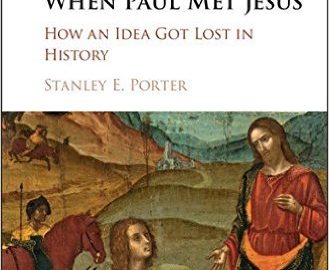“PuritanReformed” has posted a critique of my article on Van Til and “God as a Person.” First, I would like to say I appreciate that he took the time to read the article and to respond to it. Dialog and interaction is good and positive–iron sharpens iron, etc. Next, I note that this is a quick response, because I don’t think much more than that kind of response is necessary. I agree with him that for most who have studied theology to any degree, the idea that God is personal is not a blinding revelation. However, for most occupying pews in evangelicalism, especially those outside the walls of academia–some of whom I know do tend to see God as an impersonal force that, with the right incantations and behavior, can be manipulated to do their will–this concept needs to receive attention.
I used the term “essence of God” to describe the divinity shared between the three Persons of the Trinity. The point is that this “divine essence” is not impersonal, but it is by virtue of this shared divinity that the Persons share attributes of the divine, and these attributes are personal. If I may spell it out, the being of God has divine attributes that are personal, and these attributes are shared between the three Persons of the Trinity. As far as I understand, there is nothing heretical about that. Perhaps this point may be a little obvious for a Westminster Seminary student (and I mean no disrespect by that), but I daresay this is not a thought that has occupied much attention in the thinking of most evangelicals.
I would also venture to say that one of the reasons Van Til is represented as being “wrong in his doctrine of the Trinity” is because he is being quoted in a context that has more to do with apologetic approach than formal teaching on the Trinity. The reason I quoted Van Til specifically on the Trinity (and there are further quotes in the original paper) was to show that when speaking of the Trinity, his view was in line with orthodox belief. In this context, however, Van Til was addressing the personality of God in His being, not just in His Persons, and how that can be used to apologetic effect. This will be covered more in the next installment of the series. Again, I don’t think Van Til was trying to say something new about the Trinity (maybe I’m wrong, but that’s how I read Van Til); I believe he was simply drawing attention to the fact that God is personal, not just in His Persons, but in His being, and he made that point for a purpose, which, again, will be the subject of the next part of the series. Those who were left at the end of the article scratching their heads saying “Well, if all Van Til was saying is that God is a personal being, then big woop!”–hold on! Read the rest of the series, or read the original paper. I’m not done yet! 🙂
I hope this helps to clarify things. If you still disagree with me, or Van Til, PuritanReformed, then that’s fine. I would ask that you be sure you are being fair to Van Til and you are not reading his comments on the Trinity in the context of apologetics and assuming they are the sum total of his belief regarding the Trinity. Yes, there must be consistency in our beliefs, and what we believe about the Trinity in our systematic theology must be the same as in our apologetics. However, when speaking in an apologetic context, we might make statements not inconsistent with our theology as a whole, but certainly not representative of our entire belief. It is my contention that this is what has happened to Van Til on this topic, and hence the controversy. Van Til may have found the traditional Trinitarian formulations inadequate, but that doesn’t mean he disagreed with them. He simply sought to make a point regarding the personality of the Godhead that may, in the view of some, be unnecessary, but to Van Til needed to be made, again, for apologetic reasons.
I do hope, however, that this doesn’t detract from the point to be made in the next installment. If we can all agree that God is personal, in His being and in His Persons, then we are ready to move on. And I think that’s a point that we all–Van Til included–can agree upon.
Alpha and Omega Ministries is a Christian apologetics organization based in Phoenix, Arizona. James White, director, is a professor, having taught Greek, Systematic Theology, and various topics in the field of apologetics for numerous schools.




